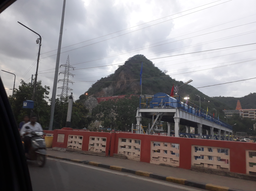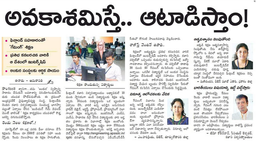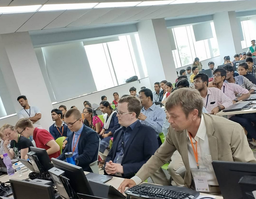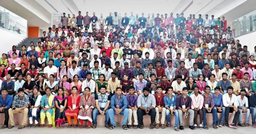Taught Game Development in India for 2 months
A couple of months ago a friend of mine informed me that my school, Kajaani University of Applied Sciences (KAMK), was going send a delegation to the state of Andhra Pradesh, India, to teach game development for two months. The event would be known as IGDC, short for Indian Game Development Challenge. KAMK was recruiting for the job so I applied and was accepted. I left Finland at the beginning of June and came back home just a day ago, 30th July. I will now attempt to describe the experience in words.
Note that this text is written from my personal perspective and does not represent the views of KAMK nor anyone else who isn't me.

Preparing and leaving for the trip
At some point in time KAMK, my school, had come in contact with APSSDC, the Andhra Pradesh State Skill Development Corporation. They had agreed on KAMK providing the programme for a two month summer course on video game development. Initially the idea had been about bringing Indian students to Finland for the summer, but this was soon diverted so that instead of sending Indians to Finland, KAMK would be sending Finns to India as teachers and organizers. A friend of mine asked me to apply to be part of the delegation going to India and I was accepted. The job was to teach and coach students at the SRM University, Amaravathi.
I don't remember when exactly I got to know I was going to India, but at most I believe it was two months or so before the actual date of leaving. I was working 8 hours a day on an engineering project at that point, so I had little time left for preparing course material or the like. The most work I got to do regarding the India project was when me and my colleague were asked to give an online presentation to some of the Indian students along with a questions and answers session. We staid at work until 9 PM making a PowerPoint because we were told the presentation would need to happen the next day at 7:30 AM. I have to say at this point that little to no time for preparation was sort of a defining feature of this trip. Anyway, the Q&A session left me with one idea on the top of the pile: I would have to work on my understanding of Indian English accents. However, it was also nice to get to know how excited some of the students already seemed.
During the same week we did the Q&A session, three people from India came to visit us in Kajaani, Finland. Two of them were from the APSSDC and one represented SRM University, the school where the course would be held. The Indians were taken hiking as well as to the sauna. Later I heard they were also taken to to see a Finnish dump pit (amongst various other things) which I thought was funny as hell. This was my first contact with Indian people, but also the first time I got to talk to our Finnish project coordinator, an all-around nice guy who would play a very important role during our stay in AP.
Finally at the beginning of June 2018 it was time to leave. I left with one other person only instead of the whole team due to various reasons I will not go into now. Our coordinator, mentioned in the above paragraph, was already waiting for us at SRM University Amaravathi, the campus we would spend the next two months at.
Arrival
We arrived near the weekend and soon met with our own man on the spot, as well as the faculty of the school. We got to see the equipment, which seemed satisfactory, but more computers would be needed - we were going to have nearly 500 students (the APSSDC took care of this well later). The lack of equipment at this point (I assume) had to do with the fact the whole school was still being built. In fact, being built is what was happening to the whole city of Amaravathi 24/7 around the university. The story goes, a couple of years ago the state had broken up into two states and the old capital, Hyderabad, staid in the other state (Telangana), where as Andhra Pradesh was going to build it's own capital from scratch. Indeed, every hour of the day the construction of the school and the city were on-going (which did not help our night sleep at all, by the way).
For our first Sunday (the working week is 6 days in India) one of our local contacts, did something very nice and took us to see his home as well as some other places nearby. That was a gesture we very much appreciated as we got a glimpse of what the country looked like outside of the borders of the campus. The area we were staying at was quite rural, so traveling on the muddy roads took a lot of time. We went to a beach as well and were probably the only people there with nothing but boxers on - I learned later Indians swim in full clothing. Of course we also went to a small temple and ate well.
The first week went on fast. I taught the students some basic concepts of game programming, like what is a program main loop, what tools can you use, etc. as well as practical game programming in C with SDL2. We also talked about version control using Git. A lot of information had to be packed into a very short period of time, and I had not had the time to really prepare any materials at home. I still regret the lack of prepared material, but many people seemed to already catch on and start working on their games. I spent a lot of time in the evenings later preparing course materials for the future since I had it fresh on my mind what was going to be needed.
A week later the rest of our team of 8 Finns arrived. Something that made the first weeks rough for us all was that students did not arrive in one bunch but at the rate of about 40 per day. The total amount at the end was about 480. This meant many things had to be taught again and again, often separately to only a few students at a time. Luckily Indians are (from my limited experience at least) social people and often the students would by themselves inform any new arrivals about various important things.

Course structure
Why would a group of Finnish people be sent to India to teach game development? My understanding is that our job was to introduce the students (and the faculty) to a more practical way of learning, since Indian education is still quite conservative, often (again, to my understanding at least) being about listening to the teacher babble while taking notes. Well, our course was certainly all about practice and not about listening to the teacher babble.
We did some lecturing at the beginning in the form if intensive courses, but just like KAMK game dev summer courses in Finland, most of the time the students worked on their game projects in teams of 4-10 using the tools they wanted. Us teachers, we were simply there available for any questions (or queries, as Indians say) they came up with, occasionally roaming around and checking out the progress being made. People caught onto this model surprisingly quickly, although I have some doubts that there were people even at the end of the course who would have preferred a more theoretical approach - different styles suit different people.
Cultural differences
For someone like me who's never been outside of Europe, seeing even a limited part of India is an eye-opening experience. Just like the EU, India consists of various states with different cultures and languages, but being an ignoramus I had little prior knowledge about how the nation was actually organized. Now I know a little more, but just a little - we only staid in one state (AP), mostly at a university campus, apart from a night or two in Delhi (and that in the near vicinity of the airport - the furthest we got out of the hotel was the liquor store).
Still regarding culture, it warms my heart to see a nation not yet completely taken over by American pop culture (Finland is just about a lost cause at this). Of course many (especially men) wear western clothing and some people know the big Hollywood or pop EDM hits, etc. But at least in the rural areas it seems that, despite the massive presence of American companies such as Coca Cola, Pepsi and the like, people still have their own style of clothing, music, films and customs. That is refreshing and gives some hope for the future of this planet to me.
To just shortly list some differences between Finnish and Indian culture: friendliness (Finnish people don't smile at strangers that much); respect (a nobody like me will get called sir or madam in India, especially wile wearing a blazer); respect for other's time (Indians have little to no sense of punctuality); coffee (Indians have to forcefully put milk and sugar into it). I also cannot help but quote a colleague of mine: how do Indians ever get anywhere by walking so slow. And yet, we all share the same basic needs and understanding of human ethics.
Improvements for the future
This summer course was the first in what is hoped to be many in the near future. Because of that our team had to learn many things in practice. Here are some of those things.
Don't make the course a competition
Since the beginning it was planned that we would choose one team from the course who would be sent to the Slush business event in Helsinki, Finland to pitch their project and company. Immediately upon hearing about this I felt it was a bad idea as it would pitch students against one another. And I feel like that exactly happened, especially towards the end. Games are a business but at least in Finland companies tend to collaborate and share information - ruthless competition isn't that big a part of the picture, or at least that's the feeling I get. Thinking of your co-learner or colleague as a competitor only creates bad blood and burns bridges.
Don't overpromise
We tried hard not to overpromise, but sometimes you should just keep your mouth completely shut instead of telling someone of the possibility of something happening. For example, we were expecting three companies from Kajaani to visit the university, but we should not have spoken about it before the companies confirmed that they were indeed coming. In the end, only one of the companies paid a visit (my greatest thanks go to Virtual Frontiers for this by the way).
Let all students show off their progress
We had nearly 500 people working on various game projects for two full months. That's a lot of working hours, especially considering the working week is 6 days in India and the working day seems to be of a varying length upwards from 8 hours. A massive effort from some very dedicated people to say the least.
All project courses at KAMK end in a post mortem session where students get to dissect everything that went right or wrong during the project period. This way students get to learn from others' mistakes and successes, but at the same time, a post mortem acts as a public revelation of a student project to the public - finally you get to show off the hard work you've done, and usually you also get some useful commentary! The post mortem event is one of the highlights of a course.
Because of scheduling problems, our own mistakes in management, travel timings, stress and various other excuses, we forgot about the post mortems at this event. That was a mistake that I feel made many students feel disappointed, to feel as if their work was not appreciated. That still bothers me. When you've made something, you want to tell the world, and you should be given the chance to do that. And of course, we would have wanted to see those games presented, too.
Keep on pitching
When a project course begins at KAMK, students must first pitch their projects to teachers and get them accepted. We did the same thing at the IGDC, but also kept on holding practice pitching sessions every Friday for the full duration of the course. That was great and should be continued - it was really motivating to see the improvements in the presentations made by the students. Some definite performers there.

Regards
All in all, for me the overwhelming feeling left of this trip is positivity. My heartfelt thanks go to the motivated and friendly students, to the helpful faculty of the organizations involved as well as to the various other great people I (we) met on the way.
The greatest motivator for me was always the progress and enthusiasm of the students who I would thank all personally did I have the time. Here's to hoping for more collaboration between Indian and Finnish educational agencies, and for more events of this kind in the future.


